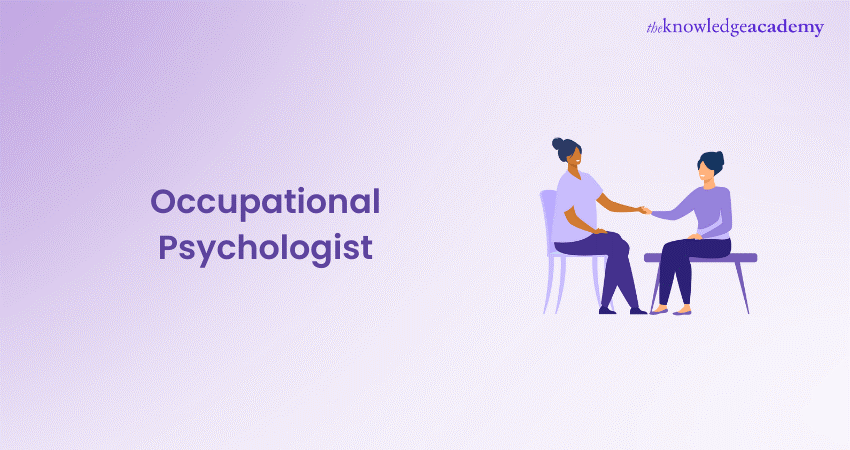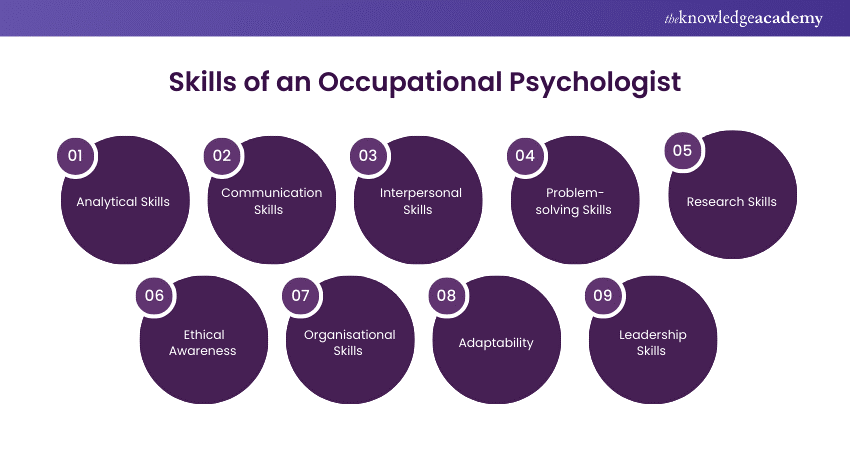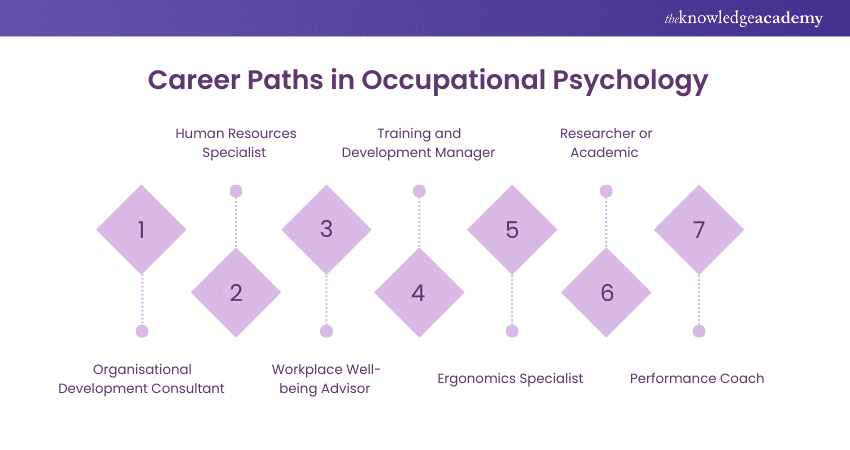We may not have the course you’re looking for. If you enquire or give us a call on 01344 203999 and speak to our training experts, we may still be able to help with your training requirements.
Training Outcomes Within Your Budget!
We ensure quality, budget-alignment, and timely delivery by our expert instructors.

Have you ever wondered who helps organisations navigate the complexities of human behaviour, ensuring a harmonious and productive environment? Enter the world of an Occupational Psychologist—a specialist dedicated to understanding and improving the relationships between people and their work.
In this blog, we’ll explore the multifaceted responsibilities of an Occupational Psychologist and uncover the key skills required to excel in this field. Additionally, we’ll dive into the various career paths that await those passionate about making a difference in the workplace. Curious to learn more about how these professionals shape the world of work? Read on!
Table of Contents
1) Who is an Occupational Psychologist?
2) Key Skills of an Occupational Psychologist
3) Occupational Psychologist Duties
4) Career Paths in Occupational Psychology
5) Conclusion
Who is an Occupational Psychologist?
An Occupational Psychologist focuses on workplace behaviour, using their expertise to enhance job satisfaction and productivity, thereby improving organisational effectiveness. They address issues such as conflict dynamics and organisational culture, often collaborating with Management, HR, and training teams to implement beneficial changes.
Their work centres on employee performance, behaviour, health, and well-being. By applying psychological insights, they aim to improve both organisational effectiveness and individual job satisfaction through various interventions, ranging from counselling support to workspace redesign.
Key Skills of an Occupational Psychologist
Occupational Psychologists require a diverse set of skills to effectively address workplace dynamics and enhance employee well-being. Let's explore the key skills essential for success in this field:

1) Analytical Skills
Analytical skills are crucial for Occupational Psychologists as they need to assess complex workplace issues, interpret data, and develop evidence-based solutions. This involves conducting research, analysing organisational structures, and evaluating the effectiveness of interventions.
2) Communication Skills
Effective Communication is vital for conveying ideas, presenting findings, and facilitating discussions. Occupational Psychologists must be able to communicate clearly and persuasively with employees, management, and other Stakeholders, both in writing and verbally.
3) Interpersonal Skills
Strong interpersonal skills enable Occupational Psychologists to build rapport and trust with clients and colleagues. This is essential for conducting interviews, providing counselling, and mediating conflicts. Empathy, Active Listening, and the ability to comprehend diverse perspectives are key components.
4) Problem-solving Skills
Problem-solving Skills are essential for identifying workplace issues and developing practical solutions. Occupational Psychologists must be adept at diagnosing problems, generating innovative ideas, and implementing effective interventions to improve organisational outcomes.
5) Research Skills
Research skills are fundamental for designing and conducting studies that inform practice. Occupational Psychologists need to be proficient in various research methodologies, data collection methods, and statistical analysis to produce reliable and valid results.
6) Ethical Awareness
Ethical awareness is critical in ensuring that interventions and practices adhere to professional standards and respect the rights and dignity of individuals. Occupational Psychologists must be knowledgeable about ethical guidelines and apply them consistently in their work.
Discover the techniques to manage stress and improve your mental health - sign up for our Mental Health Courses now!
7) Organisational Skills
Organisational skills are necessary for managing multiple projects, meeting deadlines, and maintaining detailed records. Occupational Psychologists must be able to plan, prioritise, and coordinate activities efficiently to ensure the smooth execution of their duties.
8) Adaptability
Adaptability is important for responding to changing workplace environments and evolving organisational needs. Occupational Psychologists must be flexible and open to new approaches, continuously updating their knowledge and skills to stay relevant in the field.
9) Leadership Skills
Leadership Skills are valuable for guiding teams, influencing organisational change, and promoting a positive work culture. Occupational Psychologists often take on leadership roles in projects and initiatives, requiring them to inspire and motivate others.
Occupational Psychologist Duties
Occupational Psychologists' duties encompass multiple activities aimed at improving organisational effectiveness and individual job satisfaction. By applying their expertise in Psychology, they address various aspects of workplace dynamics. Let's explore them in detail:
1) Managing Organisational Change
Occupational Psychologists play a crucial role in managing organisational change by evaluating the impact of changes on employees and developing strategies to facilitate smooth transitions. They work with Leadership to communicate changes effectively, reduce resistance, and ensure that employees are supported throughout the process.
2) Optimising Workspaces
Optimising workspaces involves designing and arranging physical environments to enhance productivity and well-being. Occupational Psychologists analyse how workspace design affects employee behaviour and satisfaction, recommending adjustments such as ergonomic furniture, lighting, and layout improvements to create a more conducive work environment.
3) Supporting Employees
Supporting employees encompasses providing Counselling and mental health support to address workplace stress, anxiety, and other psychological issues. Occupational Psychologists offer individual and group sessions, helping employees create coping strategies and improve their overall well-being.
4) Conflict Resolution and Mediation
Conflict resolution and mediation are key duties where Occupational Psychologists intervene in workplace disputes. They use their expertise to mediate conflicts, facilitate communication between parties, and develop conflict resolution strategies to restore harmony and improve team dynamics.
5) Employee Selection Processes
In employee selection processes, Occupational Psychologists design and implement assessment tools to evaluate candidates’ suitability for roles. They ensure that selection methods are fair, reliable, and valid, helping organisations hire individuals who are the best fit for the job and company culture.
6) Identifying Talent
Identifying talent involves recognising and nurturing employees’ potential. Occupational Psychologists use various assessment techniques to identify high-potential individuals and provide recommendations for their development, ensuring that the organisation retains and grows its talent pool.
7) Providing Guidance
Providing guidance includes offering expert advice on a range of workplace issues, from career development to organisational policies. Occupational Psychologists support employees and management by providing insights and recommendations based on psychological principles and research.
8) Performance Appraisals and Training
In performance appraisals and training, Occupational Psychologists develop and implement evaluation systems to assess employee performance. They design training initiatives to address skill gaps and enhance competencies, ensuring that employees have the necessary tools and knowledge to succeed in their roles.
Career Paths in Occupational Psychology
Occupational Psychology offers a diverse range of career paths, each focusing on different aspects of workplace dynamics and employee well-being. Here are some of its key career paths:

1) Organisational Development Consultant
Organisational development consultants enhance company efficiency and effectiveness through strategic planning, Change Management, and leadership development. They analyse structures, processes, and cultures to recommend performance improvements.
Learn how to cultivate positivity and resilience - sign up for our Positive Psychology Course today!
2) Human Resources Specialist
Human Resources Specialists focus on recruitment, selection, and retention. They design assessment tools, develop training, and create strategies to boost Employee Engagement and satisfaction.
3) Workplace Well-being Advisor
Workplace well-being advisors promote mental health and well-being by developing initiatives to reduce stress, prevent burnout, and support employees’ Mental Health. They often provide counselling services and wellness initiatives.
4) Training and Development Manager
Training and development managers design and oversee training to enhance employees’ skills and knowledge. They assess training needs, develop curricula, and evaluate the effectiveness of training initiatives.
5) Ergonomics Specialist
Ergonomics specialists optimise work environments for comfort and productivity. They assess workspaces, recommend ergonomic improvements, and ensure Compliance with health and safety regulations.
6) Researcher or Academic
Researchers and academics conduct studies to advance knowledge in Occupational Psychology. They explore topics like workplace motivation and leadership, contributing to evidence-based practices.
7) Performance Coach
Performance coaches work with individuals and teams to enhance performance and achieve professional goals. They identify barriers, develop action plans, and provide ongoing support and feedback.
Equip yourself with the skills needed for effective decision-making with our Mental Capacity Training – join now!
Conclusion
An Occupational Psychologist is your go-to expert for transforming workplace dynamics. By mastering employee behaviour and motivation, they don’t just improve productivity - they elevate the entire work environment. Whether you're considering a career in this field or simply want to understand its impact, their role is crucial in today’s ever-evolving workplace.
Join our Mental Health and Wellbeing Training to gain practical tools for enhancing your mental and emotional well-being!
Frequently Asked Questions

Occupational Psychology is related to HR but is a distinct field. Occupational Psychologist focuses on understanding human behaviour in the workplace to improve employee well-being, performance, and job satisfaction. In contrast, HR manages employment processes and organisational policies.

The key role of Occupational Therapy is to assist individuals in developing, recovering, or maintaining their daily living and work skills. It is essential in enabling people to achieve independence and improve their quality of life by adapting environments and tasks to their abilities.

The Knowledge Academy takes global learning to new heights, offering over 30,000 online courses across 490+ locations in 220 countries. This expansive reach ensures accessibility and convenience for learners worldwide.
Alongside our diverse Online Course Catalogue, encompassing 19 major categories, we go the extra mile by providing a plethora of free educational Online Resources like News updates, Blogs, videos, webinars, and interview questions. Tailoring learning experiences further, professionals can maximise value with customisable Course Bundles of TKA.

The Knowledge Academy’s Knowledge Pass, a prepaid voucher, adds another layer of flexibility, allowing course bookings over a 12-month period. Join us on a journey where education knows no bounds.

The Knowledge Academy offers various Mental Health Courses, including the Psychology Course, Positive Psychology Course, and Mental Capacity Training. These courses cater to different skill levels, providing comprehensive insights into How to Practice Mindfulness.
Our Health & Safety Blogs cover a range of topics related to Occupational Psychology, offering valuable resources, best practices, and industry insights. Whether you are a beginner or looking to advance your Health and Safety knowledge, The Knowledge Academy's diverse courses and informative blogs have got you covered.
Upcoming Health & Safety Resources Batches & Dates
Date
 Psychology Course
Psychology Course
Fri 14th Feb 2025
Fri 11th Apr 2025
Fri 13th Jun 2025
Fri 15th Aug 2025
Fri 10th Oct 2025
Fri 12th Dec 2025







 Top Rated Course
Top Rated Course



 If you wish to make any changes to your course, please
If you wish to make any changes to your course, please


